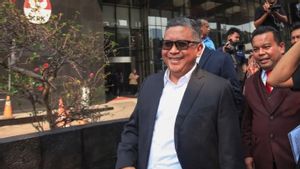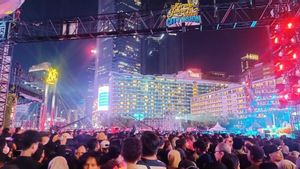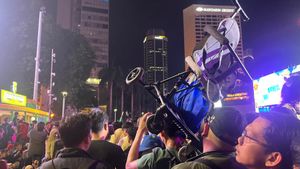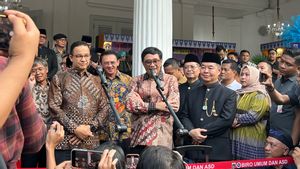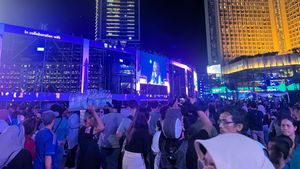JAKARTA - Former Miss Indonesia finalist, Olvah Hamid was criticized for his racist attitude towards a number of Chinese citizens at Soekarno-Hatta Airport, Tangerang, Banten. In his clarification, Olvah admitted that he had a hidden grudge because he had also been treated racist by ethnic Chinese. Racism breeds racism.
Criticism of Olvah was sparked by a video he uploaded on his Instagram Story. In the video, Olvah said he was at Soekarno Hatta Airport. Around Olvah at that time there were a number of people suspected of being Chinese citizens who had also just gotten off the plane.
"These people are all Chinese. They are afraid, you know. Afraid of us. Even though they brought the disease to Indonesia. Hey China-China. Hey, ho.. ha.. ho."
Olvah harvests criticism. It's not only his attitude that is fundamentally wrong, but also because of Olvah's persona, who has often voiced anti-racism.
The vicious circle of racismWhat can you do when "Fall" is used for colonial soldiers who died in Papua, "Syuhada" is used for suicide bombers in churches, "Common sense" is claimed by Ade Armando, "Good People" is the regime's jargon, and "Anti-Racist" is bio cake people like this? pic.twitter.com/EpalAAXyGP
— MartoⒶrt (@MartoArt) December 7, 2021
What Olvah did was no small matter. But he is a small part of the vicious circle of racism. Jakarta State University (UNJ) sociologist, Achmad Siswanto explained that there is a historical context that must be seen in the birth and growth of racism in Indonesia.
It all started in colonial times. At that time the Dutch developed a system of social stratification in society. Society is divided into three class strata.
At the top, the European group, namely the Dutch. Following, the Foreign East, which are Arabs and Chinese. As the lowest society is indigenous.
Professor of anthropology at the Faculty of Cultural Sciences, Gadjah Mada University (FIB UGM), Heddy Shri Ahimsa-Putra explained another context. According to him, the basis of racism is also caused by biological differences.
"Every human being actually must distinguish from each other based on physical characteristics. Classification of humans, everyone must do it," he said, quoted by Kompas.com.
"But when one race is considered superior, considered better, it's called racism. In human experience, the worst racism was the Nazi era against Jews," he added.

The interesting thing about Olvah's case arises in his clarification. Olvah revealed that while on the plane he felt he was treated badly by the Chinese people he pointed to in the video.
Olvah continues his narrative by telling stories from the past that describe the unpleasant experiences between himself and a handful of ethnic Chinese. These incidents occurred during the three years when Olvah lived in Surabaya.
"From certain races in Indonesia, in particular, the Chinese race, my parents and I were spat at at the mall," said Olvah.
Olvah also shared his experience of being a victim of racism while in Jakarta. Olvah, who came from West Papua, was once called a monkey.
"It gave me a wound of its own," said Olvah.
Of course Olvah's racism cannot be justified. But, again, racism is like that. It is a vicious circle that will never end. In the study of microsociology, we can see this as social interaction. There is action and response in it.
That's one. Another variable that influences the persistence of racism is prejudice. According to Siswanto, every group, including ethnic groups, has prejudices against other groups. This occurs naturally in the development of social racism.
People like Olvah are trapped in this prejudice. "It means that when he (Olvah) has experienced a form of racism, he will respond right," said Siswanto.
"He will certainly respond with the preconceived notions that have grown up. He has no other reference. He will claim, yes China is."
It's hard work. According to Siswanto, there must be a structured and systematic educational approach, for example through educational institutions to fight this racist behavior. Formal education materials must bring back the value of unity which was mandated by the founding fathers of the state.
Bhinneka Tunggal Ika really must be instilled so that it becomes a practice of social life. "There must be an educational approach through educational institutions, strengthening materials that are able to minimize racism, whether ethnic or religious groups."
"We are not present in one ethnicity or one religion, but multi-religious and multi-ethnic who are building Indonesia itself."
*Read other information about NATIONAL NEWS or read other interesting articles from Yudhistira Mahabharata.
Other BERNASThe English, Chinese, Japanese, Arabic, and French versions are automatically generated by the AI. So there may still be inaccuracies in translating, please always see Indonesian as our main language. (system supported by DigitalSiber.id)



